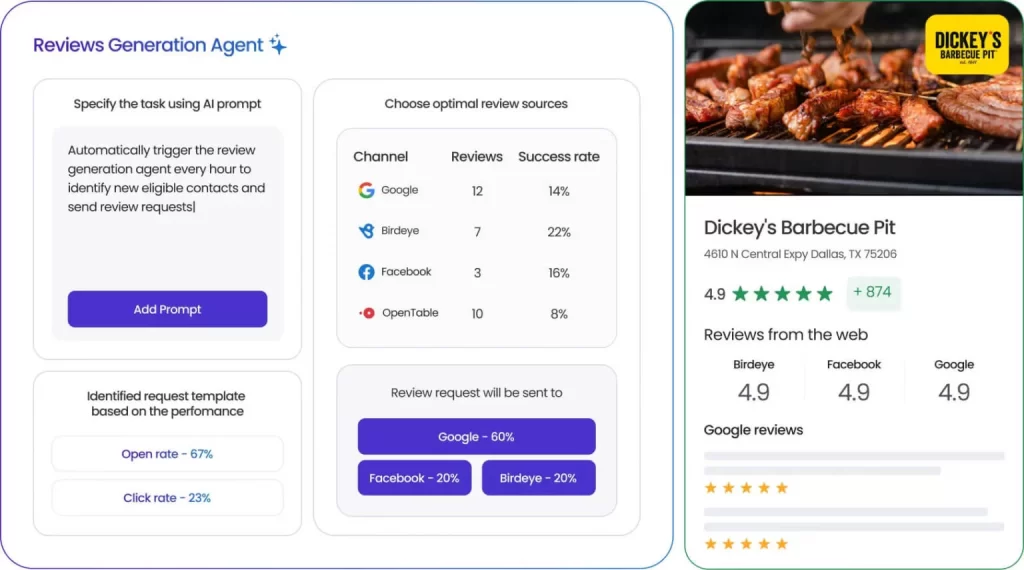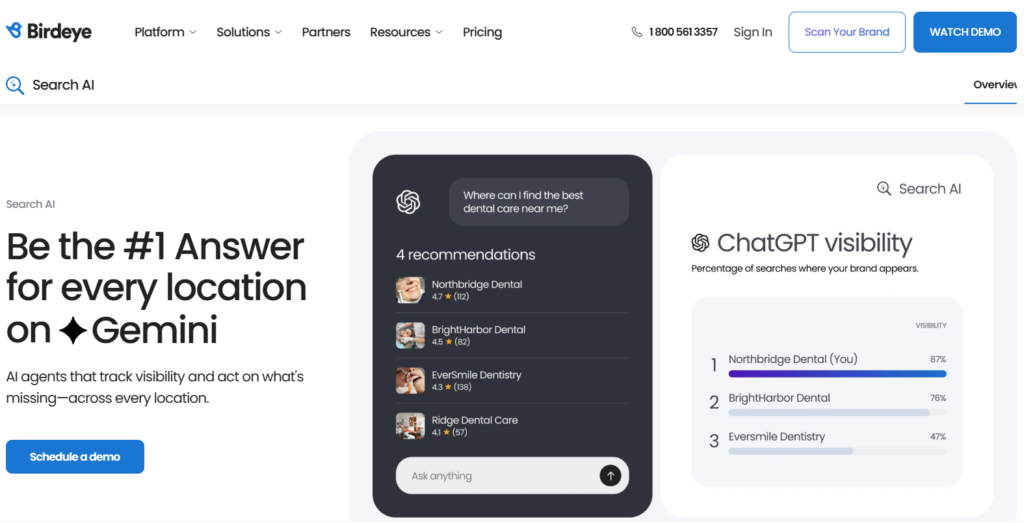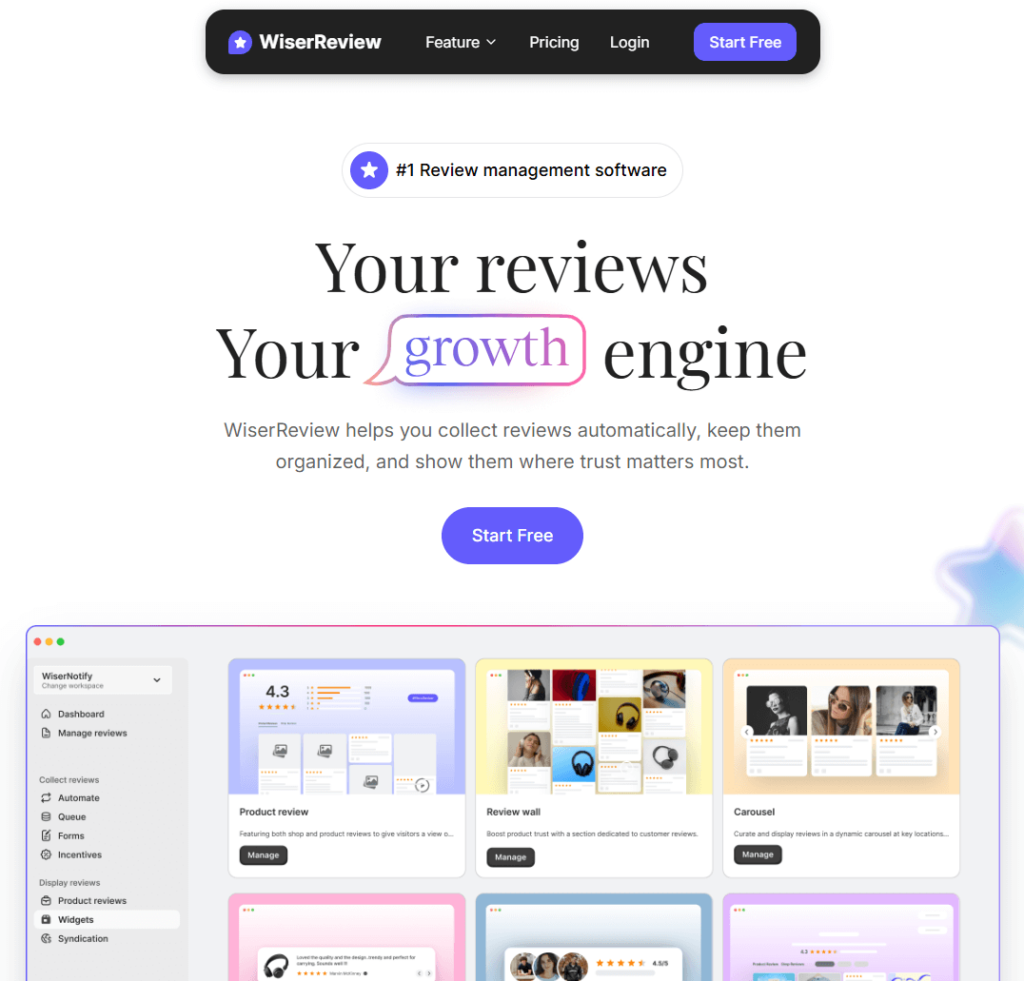In 2026, a brand’s reputation will move at the speed of social. One negative review or forum post can influence customers’ decisions across hundreds of locations. AI online reputation management (ORM) software tools use artificial intelligence to monitor conversations in real time, analyze sentiment, and automatically craft on-brand review responses. By predicting risks before they escalate, they turn reputation management into a growth opportunity rather than a damage-control exercise. Leading this shift is Birdeye, trusted by more than 200,000 businesses to unify feedback, streamline enterprise workflows, and give leaders the insights they need to protect and strengthen their brands.
Summary
This blog post will help you choose the best AI online reputation management software for 2026 using fresh, data-backed insights. With the global ORM market projected to grow at a 14% CAGR through 2027, and Gartner forecasting that 80% of enterprises will adopt GenAI-powered platforms by 2026, investing in the right solution has never been more important.
We analyzed independent reviews, integration depth, scalability, support, and pricing to rank the ten leading software for 2026. By the end, you’ll know which solution best fits your brand’s goals and how AI can turn reputation management into a measurable source of ROI.
Table of contents
Why AI is a game-changer for online reputation management
Traditional reputation management is slow and reactive. Teams spend hours tracking reviews across sites and often miss sentiment shifts until it’s too late. For multi-location brands, scattered feedback makes it even harder to spot trends and take action in time.
AI changes that. It monitors every channel at once, analyzes sentiment in real time, and drafts personalized, on-brand responses in seconds. Powered by Natural Language Processing (NLP), it understands tone, detects risks, and flags unusual patterns—like sudden spikes in negative reviews—so teams can act before small issues turn into crises.
Key advantages of AI ORM software include:
- Speed: Detects sentiment changes within minutes, not days.
- Scalability: Manages hundreds or even thousands of profiles and locations seamlessly.
- Accuracy: Picks up tone shifts and subtle signals humans may miss.
- Efficiency: Reduces staff hours spent on repetitive monitoring and responses.
- Predictive insights: Flags emerging risks before they escalate into crises.
In short, AI transforms online reputation management from a cost center into a measurable growth engine, directly tied to higher ratings, faster responses, and enterprise-wide customer trust.
Key shifts in reputation management
Now, let’s break down the three major ways AI is transforming online reputation management today.
Real-time sentiment analysis
AI reputation software continuously scans reviews, social media, forums, news sites, and even podcasts in real time, so no mention goes unnoticed. Many software now offer enterprise-scale monitoring across Google, Facebook, Trustpilot, Reddit, and X, as well as industry-specific sites for healthcare, hospitality, automotive, and more.
For multi-location enterprises, AI consolidates all this cross-channel feedback into a single dashboard, replacing fragmented reporting with clear, actionable insights.
Automated review responses with NLP
Responding to every customer review manually is slow, repetitive, and often inconsistent. AI changes that. With NLP and GPT-style models, platforms can now draft personalized, on-brand replies in seconds, helping teams keep pace without sacrificing quality.
Freshworks reports that 32% of customer service leaders already see measurable ROI from AI automation. That’s because faster, more consistent replies don’t just save time, they also build trust with customers.
To ensure quality, teams can implement guardrails, such as approval workflows, brand voice libraries, and tone controls, to ensure every response aligns with company standards.
Predictive alerts that prevent crises before they occur
AI reputation tools not only react to feedback, but also predict it. Using anomaly detection, these platforms flag unusual patterns such as a sudden spike in negative reviews from a specific location or product line. This early warning system helps enterprises intervene before issues spiral into full-blown PR crises.
For instance, industry research shows that a 10% drop in sentiment within a single day can signal a potential backlash. Acting quickly on these insights helps brands fix problems and reassure customers before negative stories spread online. Birdeye customers see this in action. D4C Dental Brands, for example, used Birdeye Insights AI to flag recurring patient-experience issues such as long wait times at certain offices. Leadership adjusted staffing before these issues escalated into broader negative sentiment, a clear demonstration of how predictive insights can turn potential crises into opportunities to improve service.
How we ranked the best AI reputation software
Choosing the right AI ORM software shouldn’t rely on vendor claims. To keep this ranking transparent and actionable, we applied a data-backed methodology rooted in enterprise usage. (Note that no vendor paid for inclusion.)
Data sources
Our evaluation combined both quantitative and qualitative inputs from enterprise users and trusted third-party software:
- Enterprise survey: Feedback from 483 multi-location businesses actively using ORM software.
- Independent reviews: Analysis of 2,100 verified ratings across G2, Capterra, and AppExchange.
- Vendor and customer documentation: Insights into integrations, support SLAs, and deployment readiness.
This approach ensured we captured both day-to-day user experience and long-term enterprise impact.
Scoring criteria
Each software was scored across weighted criteria that reflect what matters most:
| Criterion | Weight | Data source |
| AI Capability: Depth of NLP, automation, anomaly detection | 35% | User survey + G2 reviews |
| Scalability: Multi-location support, enterprise readiness | 25% | Enterprise survey + case studies |
| Integrations: CRM, POS, ticketing, BI tools | 20% | Vendor docs + customer reviews |
| Value/Price: Affordability relative to feature depth | 20% | Pricing disclosures + user sentiment |
Why these factors matter
- AI capability: Reputation moves at the speed of sentiment. Strong NLP and predictive analytics are now non-negotiable.
- Scalability: Enterprises demand uptime SLAs, role-based permissions, and support across hundreds of locations. SMB-focused tools fall short.
- System connectivity: CRM, POS, ticketing, and BI integrations unlock ROI by embedding reputation insights into enterprise workflows.
- Value/Price: Features mean little if the cost isn’t justified. Transparent pricing and ROI feedback were weighted heavily.
Scores favor software that delivers reliable AI outcomes at a multi-location scale and connect seamlessly to enterprise systems.
The result
Each tool’s final score reflects a weighted average across these factors, ensuring that our ranking highlights proven impact on customer engagement, enterprise workflows, revenue, and brand trust, not just popularity.
Here’s how the top ten software scored against our criteria.
Top 10 AI reputation management tools reviewed
Here are the ten leading AI online reputation management software for 2026. Each profile highlights the standout AI features, best-fit industries, pricing, and a real-world proof point.
| Tool | Best for | Standout AI capability | Pricing |
| Birdeye | Multi-location enterprises in healthcare, financial services, automotive, and retail | Omnichannel review automation, multilingual AI responses, predictive sentiment alerts, listings optimization, and benchmarking agents | Flexible, value-based pricing tailored to business size & locations |
| WiserReview | SMBs, ecommerce, SaaS, and local or multi-location businesses focused on conversions | Automated Google review collection, real-time review syncing, AI-assisted filtering, and conversion-optimized on-site review widgets | Free plan available; paid plans start around $9–$19/month, depending on features |
| Reputation | Large enterprises needing department- and location-level insights with benchmarking | Granular sentiment analysis, department/location dashboards, and competitor benchmarking | Custom/quote-based enterprise pricing |
| Brand24 | Mid-market brands & PR teams monitoring crises | Anomaly detection for sentiment spikes, AI summaries, influencer impact tracking, topic & sentiment analysis | Flexible plans by mentions & users; more affordable than enterprise tools |
| Yext | Multi-location businesses needing local SEO + reviews | Listing accuracy automation, AI-assisted review replies, Knowledge Graph, and sentiment tagging | Per-location pricing; plans range from ~$199–$999/year/location, with enterprise quotes |
| Sprout Social | Enterprises/agencies with high-volume social engagement | Advanced social listening, sentiment-aware tagging, task automation, AI insight summaries, and crisis alerts | Per-user pricing starts at $199/user/month (annual); higher tiers for advanced tools |
| Podium | Service-oriented SMBs (dental, auto, home services, medical practices) | SMS-based review requests, AI-suggested review responses, 24/7 conversational AI assistant, and unified inbox with analytics | Quote-based pricing (Core, Pro, Signature tiers) |
| Mention | PR teams, agencies, and fast-scaling consumer brands | Real-time monitoring across 75+ sources, AI sentiment tagging, competitor benchmarking, and noise filtering | Enterprise plan starts at $599/month (billed annually) for large-scale monitoring |
| Talkwalker | Global consumer brands & entertainment | Multimodal AI: text, visual recognition, and voice/audio sentiment analysis | Enterprise-only; tailored to brand/agency needs |
| BrandWatch | Enterprises, financial services, and multinational consumer brands needing multilingual, large-scale analysis | Custom AI classifiers, multilingual sentiment analysis, visual/image monitoring, and competitive benchmarking with share of voice tracking | Custom quote-based pricing tailored to organization size, monitoring scale, and features |
1. Birdeye

Birdeye stands out as a leading AI-powered online reputation management solution for enterprise businesses, empowering global brands to proactively monitor, manage, and optimize their digital reputation at scale. Built especially for multi-location enterprises, Birdeye deploys agentic AI systems that act autonomously to complete complex ORM tasks, driving measurable business outcomes while freeing teams to focus on customer engagement.
Using a centralized platform, enterprises can monitor feedback across key review sites and social channels, automate review generation and response with Reviews AI, refine local search profiles with Listings AI, and enhance brand discoverability with Search AI, which ensures locations surface consistently across emerging AI-powered search platforms. Real-time alerts, actionable insights, and adaptive AI automation give businesses the agility to protect and grow their reputation.

Standout AI capabilities
Autonomous reviews AI agents
Automatically request, respond to, and market reviews around the clock, ensuring consistent reputation management across every location and review channel.
Agentic AI foundation
Provides a unified AI framework that powers autonomous reputation, discovery, and engagement workflows. Configurable agents work across reviews, listings, search visibility, messaging, and analytics to support consistency and governance for enterprise brands.
Multilingual review response generator
Delivers brand-compliant, human-like replies in multiple languages using intelligent translation and tone monitoring for enhanced global engagement.
Listings optimization agent
Analyzes local search trends, recommends updates, and executes platform changes automatically to maximize visibility and increase foot traffic for each location.
Search AI visibility engine
Ensures brands are accurately represented on emerging AI-powered search platforms (ChatGPT, Gemini, Perplexity, etc.) by monitoring visibility, detecting gaps, and auditing/optimizing brand data so every location shows up where customers are searching.
Intelligent review monitoring
Flags fake or spam reviews and escalates sensitive feedback for timely action, helping protect brand credibility across all touchpoints.
Real-time notification and reporting agents
Deliver immediate alerts and actionable insights, supporting proactive ORM efforts and agile business decision-making.
Social AI agents
Manage publishing calendars, respond to customer interactions, and ensure content is on-brand and consistent across all platforms.
Lead generation and messaging agents
Capture leads, qualify intent, and maintain ongoing conversations, with CRM integration for personalized follow-ups and higher conversions.
Deep analytics and benchmarking agents
Conduct SWOT analysis, reputation trend tracking, and directly tie AI-driven actions to outcomes such as local SEO and revenue growth.
Custom AI agents
Empower enterprises to create tailored automated workflows that evolve with specific objectives and business needs at scale.

With 3,000+ enterprise integrations (CRM, POS, ticketing, BI, and more), Birdeye seamlessly integrates into complex workflows, reducing manual work and boosting ROI.
Best fit industries: Healthcare, financial services, retail, automotive, and other multi-location enterprises that need consistent, scalable reputation management.
Pricing: Birdeye offers flexible, value-based pricing tailored to each business’s unique needs and scale, ensuring maximum ROI. Please connect with our team to get a personalized quote for your business.
Case study: Indiana Members Credit Union
Industry: Financial Services
Locations: 30+ branches across Indiana
Indiana Members Credit Union (IMCU), one of the state’s leading credit unions, faced a common challenge: ensuring consistent reputation management across dozens of branches. With thousands of members depending on accurate information and trusted reviews, IMCU needed a platform that could unify listings management and streamline review workflows at scale.
The Birdeye Solution
IMCU adopted Birdeye’s AI-powered reputation platform, leveraging:
• Listings AI to ensure accurate, consistent business information across Google, Apple Maps, Facebook, and industry directories.
• Reviews AI Agents to drive review growth, generate on-brand, personalized responses, and surface early warning signals through reporting and sentiment analysis.
• Seamless enterprise integrations to connect review and listings data with their internal systems for improved workflows and faster action.
Results in 12 Months
• 2,000+ new reviews generated, boosting visibility and credibility across all locations.
• Google's rating improved from 3.9 to 4.4, significantly strengthening member trust.
• 98% response rate with a 24-hour response time
Impact
By consolidating listings and reviews into a single AI-driven platform, IMCU reduced manual effort for branch staff, improved transparency across leadership, and strengthened long-term member acquisition and retention.
2. WiserReview

WiserReview is a Google review management platform built to help businesses collect, manage, and showcase customer reviews that influence trust and conversions. It focuses on turning Google reviews into visible social proof across websites rather than offering a broad, enterprise ORM suite.
Standout AI & automation features
- Automated Google review collection: Sends review requests via email, SMS, or shareable links to support consistent growth in Google reviews.
- Real-time Google review sync: Automatically pulls in new reviews and keeps on-site displays up to date.
- Review filtering and moderation: Helps highlight high-quality reviews and manage which reviews are displayed publicly.
- Conversion-optimized review widgets: Displays Google reviews using badges, sliders, popups, and testimonial layouts on key pages.
Best fit industries
Ecommerce, SaaS, agencies, and local or multi-location businesses focused on improving conversions with Google reviews.
Pricing
WiserReview offers a free plan, with affordable paid plans starting around $9–$19 per month, depending on features and widget customization, making it accessible to small and mid-sized businesses.
3. Reputation

Reputation provides enterprises with deep visibility into customer sentiment through department-level dashboards, location filters, and competitive benchmarking tools. These features enable tracking performance across regions, service lines, and key competitors.
Standout AI capabilities
- Department and location-based dashboards: Deliver granular insights into performance at the branch or department level, helping enterprises spot patterns across regions.
- Competitive benchmarking: Allows brands to measure sentiment and star ratings against direct competitors in their industry.
- Sentiment classification: Automatically tags reviews and feedback as positive, neutral, or negative for quick triage.
- Enterprise integrations: Connects with platforms like Salesforce and ServiceNow to unify feedback data across systems.
Best fit industries
Large enterprises and multi-location organizations in sectors such as retail chains, hospitality, telecommunications, and healthcare, especially those with multiple departments and regions to monitor.
Pricing
Reputation is positioned as a premium enterprise solution, delivered on a custom/quote basis rather than published fixed tiers.
4. Brand24

Brand24 helps mid-market brands and PR teams monitor conversations in real time and detect early signs of potential crises. Its AI-powered tools focus on spotting unusual spikes in mentions or sentiment so teams can act before issues escalate.
Standout AI features
- AI Brand Assistant: Summarizes large volumes of conversations into key takeaways, trending themes, and potential risks.
- Anomaly Detector: Flags unusual spikes in brand mentions or negative sentiment, helping teams react before a crisis spreads.
- Influencer impact detection: Identifies when high-profile users or competitors are driving online conversations.
Topic and sentiment analysis: Surfaces recurring issues and audience sentiment shifts across social forums and review platforms.
Best fit industries
Mid-market and consumer-facing brands in sectors like food service, retail, travel, or PR agencies that need elevated visibility without complete enterprise-scale infrastructure.
Pricing
Brand24 offers flexible plans based on the number of monitored mentions and users, making it more affordable than many enterprise-scale solutions.
5. Yext

Yext combines business listings management with AI-powered review automation, making it ideal for brands where local visibility and reputation go hand in hand. By ensuring accurate listings and pairing them with timely review responses, Yext directly strengthens local SEO, improving visibility in map results and driving higher conversions for multi-location businesses.
Standout AI features
- AI-assisted review response: Drafts suggested replies to reviews with options for customization and approval.
- Listing accuracy automation: Helps maintain consistent business details across directories like Google, Apple Maps, and Yelp.
- Knowledge Graph support: Provides a structured database for brand information that powers listings and reputation tools.
- Basic sentiment tagging: Categorizes review text by tone (positive, neutral, negative) to spot recurring themes.
Best fit industries
Multi-location businesses in hospitality, healthcare, and retail, where accurate listings and quick review responses directly influence search rankings and conversions.
Pricing
Yext uses a per-location pricing model; independent reports suggest plans typically range from $199 to $999 per year per location, though enterprise deals often require custom quotes.
6. Sprout Social

Sprout Social is widely known as a social media management platform, but its advanced listening and sentiment tagging features make it a strong option for reputation management. By combining monitoring with task routing and workflow automation, it helps turn high-volume conversations into actionable insights.
Standout AI capabilities
- Sentiment-aware social listening: Monitors mentions across social networks, forums, and blogs and automatically tags tone (positive/neutral/negative).
- AI assistants for insight generation: Features like “Analyze by AI Assist” create summaries of large data sets and surface key themes and trends for easier decision-making.
- Automated task routing & priority tagging: Routes comments, messages, or reviews to the right team member based on sentiment or topic so you respond faster.
- Multilingual and emoji-aware analysis: Understands slang, emojis, and multiple languages to provide deeper insights across global social conversations.
Best fit industries
Enterprises and agencies with high social engagement volumes, particularly in retail, consumer goods, and financial services, where reputations often unfold on public platforms.
Pricing
Sprout Social uses a per-user pricing model, with plans starting around $199 per user/month (billed annually). Higher-tier plans include more advanced listening and sentiment features.
7. Podium

Podium takes a mobile-first approach to reputation management by enabling businesses to request reviews and respond quickly via SMS and text channels. Its streamlined workflows help service-based businesses boost review volume and stay responsive on the go.
Standout AI features
- Automated review-request workflows: Send text-based prompts to customers post-interaction, helping increase review volume.
- AI-suggested review responses: Provides personalized, on-brand reply suggestions for reviews on Google and Facebook, saving time and improving consistency.
- 24/7 conversational AI “Employee”: Handles incoming messages and reviews round-the-clock, reducing the risk of missed feedback and accelerating response times.
- Unified messaging inbox & analytics: Consolidates SMS, reviews, chats, and messages into one dashboard and uses AI to surface trends and performance across locations.
Best fit industries
Service-oriented SMBs where reviews are a key driver of local SEO and customer acquisition, like automotive, dental, home services, and medical practices
Pricing
Podium uses a quote-based pricing model. It mentions plans tailored to local businesses and multi-location operations (Core, Pro, Signature) with AI review and messaging features included.
8. Mention

Mention specializes in real-time tracking of brand mentions across social media, review sites, news outlets, blogs, and forums. It gives brands broad visibility into online conversations and helps PR or brand teams act quickly on reputational risks.
Standout AI features
- Real-time mention tracking: Monitors social platforms, news sites, blogs, forums and 75+ review sites in real time.
- Sentiment analysis: Automatically classifies mentions as positive, neutral or negative to help brands prioritize responses.
- Competitor benchmarking & share-of-voice: Measures brand visibility and sentiment compared to competitors.
- Boolean filtering and noise reduction: Enables detailed query logic and filters to cut irrelevant mentions and refine insights.
Best fit industries
Ideal for PR teams, agencies, and fast-scaling consumer brands that need to manage media narratives across multiple channels.
Pricing
Mention’s Enterprise plan starts at US $599/month (billed annually) for organizations with large-scale monitoring needs.
9. Talkwalker

Talkwalker specializes in comprehensive consumer and brand intelligence by analysing not only text, but also images, audio, podcasts, and video. It’s particularly valuable for brands with strong visual assets or a global, multi-channel footprint.
Standout AI features
- Visual Recognition: Identifies logos, products, and brand imagery in photos and videos across digital and social channels.
- Audio & Speech Monitoring: Captures mentions in podcasts and broadcasts, extending coverage beyond text.
- Trend & Sentiment Alerts: Detects spikes in conversation or shifts in tone, helping teams spot potential risks early.
- Competitor & Market Benchmarking: Provides comparative insights into brand share of voice across industries.
Best fit industries
Consumer brands, retail, entertainment, and other sectors where brand imagery, visual assets, packaging, or voice-driven content play a central role.
Pricing
Talkwalker offers three tiers: Listen, Analyze, and Business, but pricing is custom quote-based. Plans scale with monitoring volume, insights, and enterprise governance features.
10. Brandwatch

Brandwatch provides advanced social listening and consumer intelligence tools, enabling brands to monitor sentiment, track visual content, and benchmark against competitors across global markets. Its strength lies in large-scale monitoring and analytics, making it a fit for organizations that need broad insights into online conversations.
Standout AI features
- Custom AI classifiers: Allows brands to train models on their own datasets to categorize sentiment, intent, and topics with high precision.
- Multilingual sentiment analysis: Analyze data across 100M+ online sources in multiple languages.
- Visual and image-based monitoring: Captures brand mentions through logos and visual content in posts and images, extending beyond text.
- Competitive benchmarking & share of voice tracking: Measures brand visibility and performance compared to peers across industries.
Best fit industries
Enterprises, financial services, and multinational consumer brands that require multilingual monitoring and in-depth competitive insights.
Pricing
Brandwatch operates on a custom quote-based model. Pricing is tailored to organization size, monitoring scale, and feature needs.
Choosing the right AI reputation software for your brand
The best software for you depends on your business model, team size, and goals. Here are three things to check before making a choice:
1. Evaluate AI model transparency and accuracy
Ask vendors to explain how their AI works. Look for details on error rates, safeguards, and how the AI is trained to analyze sentiment or write responses. This is especially important in sensitive industries like healthcare or finance.
Best practice: Run a pilot by feeding your last 100 customer reviews into the platform. This helps validate sentiment accuracy and test whether AI-generated responses align with your brand voice before a full rollout.
2. Check CRM, ticketing, and BI integrations
A platform is only as effective as the systems it connects to. Check for native integrations with your CRM, POS, ticketing, or BI tools. Relying on third-party connectors can add cost and complexity.
Example integration checklist:
| Required system | Built-in integration | API support |
| Salesforce CRM | Yes | Yes |
| HubSpot | Yes | Yes |
| ServiceNow | Limited | Yes |
| Tableau/BI tool | No | Yes |
Tip: Adapt this checklist to the specific systems your business depends on.
3. Match pricing and scalability to business size
Vendors use different pricing models, so choose what fits your structure:
- Seat-based: Charged per user; best for small teams.
- Location-based: Charged per business unit; ideal for franchises and multi-location brands.
- Usage-based: Charged per volume of mentions or API calls; common among enterprise solutions.
Always ask about hidden costs, such as onboarding fees, premium modules, or API usage charges.
With these criteria in mind, you can now compare the top ten AI reputation software we reviewed above to find the best fit for your brand’s scale and goals.
The future of AI-driven reputation management
The next wave of tools will go beyond tracking sentiment. They’ll predict outcomes, enforce ethical safeguards, and adapt to industry-specific needs. Three trends are leading the way.
1. Predictive reputation scoring and ROI forecasting
AI is moving from just reporting on reviews to showing how they affect revenue. For example, if a hotel’s rating drops by 0.3 stars, an AI tool could predict a 12% fall in bookings, which could mean millions in lost sales. With this insight, businesses can act quickly to protect both their reputation and profits.
2. Ethical considerations and data privacy safeguards
AI ethics refers to the principles that ensure AI systems operate fairly, transparently, and without harmful bias. In the context of ORM, this means balancing automation with accountability.
As AI grows, trust and compliance become critical. Industries such as healthcare and finance must comply with strict rules (GDPR, CCPA, HIPAA).
Good practices include:
- Maintaining audit logs to track AI-driven activity
- Keeping humans in the loop for sensitive responses
- Conducting regular bias tests to ensure fairness
- Disclosing when AI assists in communications
The winners will be the platforms that combine innovation with transparency and accountability.
3. Industry-specific AI models
Generic AI often misinterprets industry-specific language, limiting accuracy. That’s why tools are being trained for specific industries. For example:
- Healthcare: HIPAA-compliant sentiment models flag patient experience risks without exposing sensitive health data.
- Automotive: Dealership-focused AI detects common churn signals such as repeated service complaints.
- Finance: Compliance-tuned models monitor reputational risk in customer complaints and escalate before regulatory exposure.
Tailoring AI to each industry means more accurate insights, stronger compliance, and better decision-making.
FAQs
Yes. Platforms like Birdeye connect directly with systems such as Salesforce, HubSpot, and Zoho. Most also offer open APIs, so you can easily link them to ticketing systems, POS platforms, and BI dashboards. This keeps all customer data in one place.
Yes. Good platforms let you set style guides, tone controls, and approval steps so replies always match your brand. They also learn from past responses to get better over time. Everyday reviews can be automated, while sensitive ones can go to a human for review.
Most businesses track things like:
– Star rating improvements
– Response rate and speed
– Changes in customer sentiment
– Revenue impact (for example, how a 0.1-star rating gain boosts conversions)
Yes. Top vendors maintain compliance with GDPR, CCPA, SOC 2, and HIPAA. Features like encryption, opt-out options, and clear data policies protect customer information.
Usually within 30-90 days. Early improvements include more reviews, faster responses, and better sentiment scores. Over time, these gains build trust and increase revenue.
Scale reputation smarter with Birdeye
Birdeye is an enterprise-grade, agentic reputation management platform built for multi-location brands that need centralized control with consistent local execution. It brings reviews, listings accuracy, AI-driven discovery, and reputation insights into one system, managing brand presence across 200+ review and listing sites. Trusted by leading global brands, Birdeye is rated 4.7/5 on G2 and 4.7/5 on Capterra and recognized with multiple industry awards for reputation and customer experience leadership.
Powered by an agentic AI framework, Birdeye connects reputation data to real business workflows, so teams can act on feedback, not just collect it. Configurable AI agents work within brand and location-level rules to monitor reviews, generate on-brand responses, and surface risks early, supported by 3,000+ integrations across CRM, POS, EHR/EMR, PMS, and other enterprise systems.
This is how Birdeye simplifies reputation management at scale:
- Instant insights: Track reviews across all major sites in real time with AI-powered dashboards.
- On-brand responses at scale: The Review Response Agent (powered by Brand AI) drafts personalized replies in seconds while maintaining your brand voice.
- Early issue detection: The Review Reporting Agent highlights shifts in sentiment and location-specific risks before they escalate.
- Enterprise integrations: Works with over 3,000 systems, including CRMs, POS, ticketing, and BI tools.
- Proven results: Boost star ratings, reduce churn, and connect reputation improvements directly to revenue growth.
Want to see it in action? Watch a free demo and discover how Birdeye helps brands stay ahead of every review, mention, and customer conversation.

Originally published









